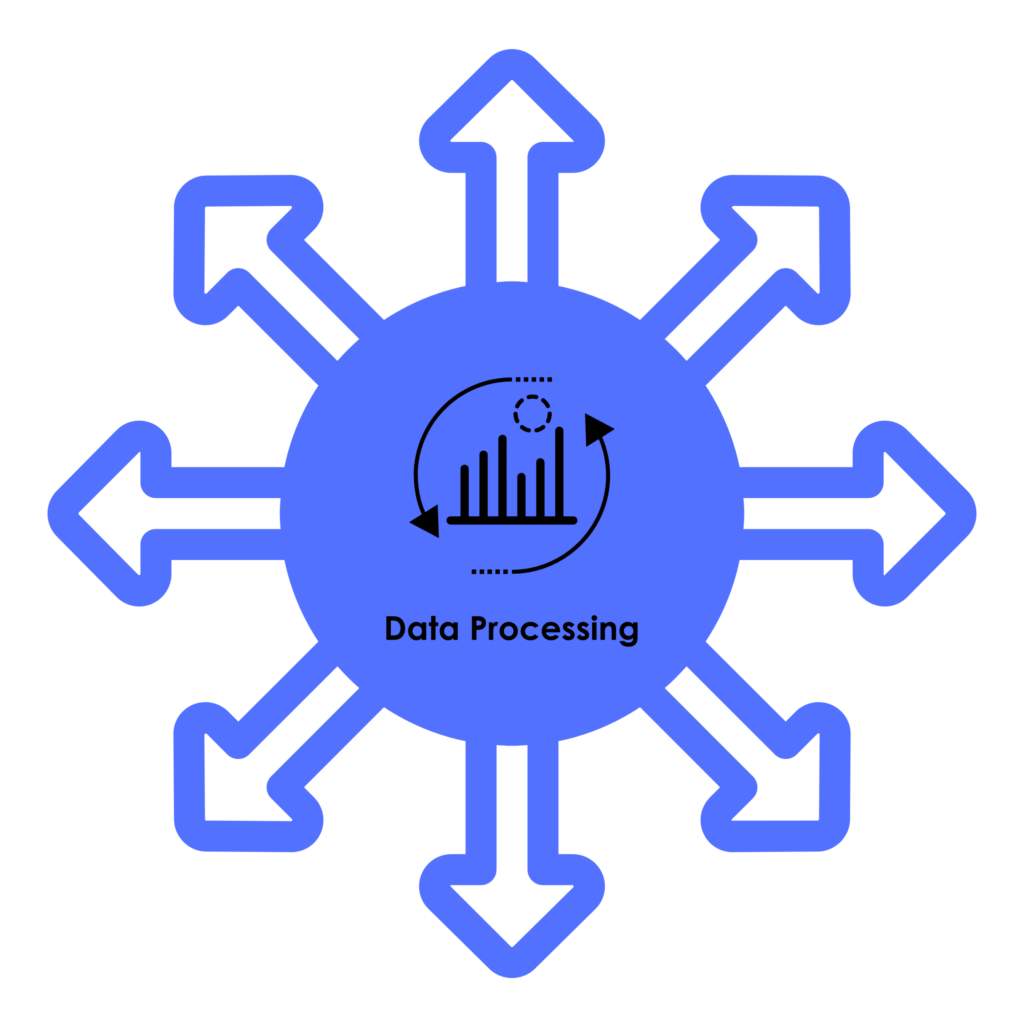Many companies are turning to data outsourcing for faster growth and smarter decisions. Can it make a difference for you?
Businesses nowadays run on data — it’s like fuel. And if data is the new fuel, then data processing companies are like oil refineries.
You can also get your data in-house, but setting up a data refinery takes time and resources.
Another option is outsourcing data. But what of the quality, privacy, and costs?
Follow along as we investigate data outsourcing and how it can impact your business.
But first, what the heck is data outsourcing anyways?
What is data outsourcing?
Data outsourcing is outsourcing your data processing and analysis to a third-party company. You may do this for many reasons, including cost savings, time efficiency, or simply because you have no in-house expertise in that area.
This is so popular with companies today because it allows them to focus on their core business while having someone else handle all technical aspects.
How do you outsource data?
There are several ways to outsource your data management activities. You can offload the burden of data to a third-party service, find a freelancer data specialist, hire an in-house data technician, or even do it yourself. We’ll parse these options into external and internal data processing.
Internal outsourcing
The most common way to outsource is by hiring an internal employee or contractor responsible for all aspects of managing your database(s) and related applications (e.g., analytics, reporting, etc.).
This can be a good option if you have someone in-house that has expertise in this area, and there is no need to train them on new technologies or processes.
The downside is that it may take longer than anticipated to get up and running with the outsourced services. They require time to learn new skills and procedures before performing their duties effectively on behalf of your organization.
In addition, when using an internal person, you must also make sure they understand how their actions affect other parts of your business; otherwise, they could inadvertently cause problems.
External outsourcing
Another option for outsourcing involves having a vendor perform all aspects of managing your databases, such as:
- Creating tables/tablespaces/columns/indexes
- Storing structured data in files
- Loading these files into databases via SQL Server Integration Services (SSIS)
- Performing ETL operations against these databases, such as cleansing/normalizing data before loading it into SQL databases
- And performing other data management tasks.
This approach is very similar to using an internal person as an outsourcer; however, you can have a vendor perform all of these functions on your behalf for a fixed monthly fee (e.g., $5K per month).
Why should I outsource my data processing?

Developing new security issues
Outsourcing data can mean that you will not have as much control over how your data is handled and stored, which could lead to problems later on when it comes time for you to use this information.
After examining internal and external data processing, you may decide to stick with in-house data intelligence.
It’s a wise choice considering the importance of your privacy and plainly – having it that way you want it. The good news is that data collection and management have become accessible to all business sizes and budgets.
Let’s take a quick look at DIY data intelligence.
DIY Data Intelligence.
When you source your data internally, you will be able to control how the information is handled and stored. This means that you will have more control over the quality of the data sent to your company.
The essential parts of data collection and analysis are finding the right web scraping tools.
The most important thing to remember when choosing a web scraping tool is that it should be able to handle the data efficiently and effectively. This means that you need to ensure that the tool can pull data from multiple sources and provide some kind of analysis afterward.
There are several different web scraping tools available today, each with its unique features and benefits. Choosing a scraper is beyond the scope of this guide. However, How to Find the Right Web Scraping Tools for the Job is a great place to start.
Once you have found the right web scraping tools, you need to pair them with high-quality rotating residential proxies.
Other than providing you with the most current data science practices to keep your business ahead of the curve, we want to be your proxy provider should you need to safely and efficiently scrape data.
Contact the IPBurger team for details and discover the right plan for you.

Missing domain expertise and context
If you outsource data collection and analysis to a third-party service, you may have to bring them up to speed. Even after onboarding an external data service, they don’t know your business like you and your team. Communication and realistic expectations will be critical.

Developing new security issues
Outsourcing data can mean that you will not have as much control over how your data is handled and stored, which could lead to problems later on when it comes time for you to use this information.
After examining internal and external data processing, you may decide to stick with in-house data intelligence.
It’s a wise choice considering the importance of your privacy and plainly – having it that way you want it. The good news is that data collection and management have become accessible to all business sizes and budgets.
Let’s take a quick look at DIY data intelligence.
DIY Data Intelligence.
When you source your data internally, you will be able to control how the information is handled and stored. This means that you will have more control over the quality of the data sent to your company.
The essential parts of data collection and analysis are finding the right web scraping tools.
The most important thing to remember when choosing a web scraping tool is that it should be able to handle the data efficiently and effectively. This means that you need to ensure that the tool can pull data from multiple sources and provide some kind of analysis afterward.
There are several different web scraping tools available today, each with its unique features and benefits. Choosing a scraper is beyond the scope of this guide. However, How to Find the Right Web Scraping Tools for the Job is a great place to start.
Once you have found the right web scraping tools, you need to pair them with high-quality rotating residential proxies.
Other than providing you with the most current data science practices to keep your business ahead of the curve, we want to be your proxy provider should you need to safely and efficiently scrape data.
Contact the IPBurger team for details and discover the right plan for you.

Improve security
Outsourcing data helps to improve your company’s overall security. This is because you can keep an eye on what information is being sent over the internet and how it is being used, preventing any potential breaches or unauthorized access by third parties.
What are the problems with data outsourcing?
Outsourcing data can have its drawbacks. Some of the problems that you may encounter include:
- Increased costs for services you don’t need
- Data that’s missing domain expertise and context
- New security issues from outsiders
Let’s zoom in to each of these disadvantages.

Increased costs for services you don’t need
Outsourcing data can make your company more efficient, but it may also mean that you will have to pay more for services than you would if you were using internal staff members to perform these tasks.
This is because outsourcing companies usually charge higher rates than providers working directly with your employees – so be sure that you do not end up paying too much for what should be an easy and quick process.

Missing domain expertise and context
If you outsource data collection and analysis to a third-party service, you may have to bring them up to speed. Even after onboarding an external data service, they don’t know your business like you and your team. Communication and realistic expectations will be critical.

Developing new security issues
Outsourcing data can mean that you will not have as much control over how your data is handled and stored, which could lead to problems later on when it comes time for you to use this information.
After examining internal and external data processing, you may decide to stick with in-house data intelligence.
It’s a wise choice considering the importance of your privacy and plainly – having it that way you want it. The good news is that data collection and management have become accessible to all business sizes and budgets.
Let’s take a quick look at DIY data intelligence.
DIY Data Intelligence.
When you source your data internally, you will be able to control how the information is handled and stored. This means that you will have more control over the quality of the data sent to your company.
The essential parts of data collection and analysis are finding the right web scraping tools.
The most important thing to remember when choosing a web scraping tool is that it should be able to handle the data efficiently and effectively. This means that you need to ensure that the tool can pull data from multiple sources and provide some kind of analysis afterward.
There are several different web scraping tools available today, each with its unique features and benefits. Choosing a scraper is beyond the scope of this guide. However, How to Find the Right Web Scraping Tools for the Job is a great place to start.
Once you have found the right web scraping tools, you need to pair them with high-quality rotating residential proxies.
Other than providing you with the most current data science practices to keep your business ahead of the curve, we want to be your proxy provider should you need to safely and efficiently scrape data.
Contact the IPBurger team for details and discover the right plan for you.

Outsourcing your data processing can help:
- Reduce the cost of data analysis
- Improve efficiency
- Improve security
Let’s take a closer look!

Reduce the cost of data analysis
Outsourcing allows you to reduce costs by offloading the data processing and storage tasks performed in-house to a third party. This can help you increase your IT budget, which you can use for other projects or areas of your business that require more resources.
You may also find that outsourced services are more affordable than those provided internally – mainly if a service provider with better expertise and lower overhead costs than those within your organization gives them.

Improve efficiency
By outsourcing some of the work required regularly, you free up valuable staff time and improve overall efficiency within your organization. It is easier for employees to focus on their core responsibilities instead of performing repetitive tasks repeatedly at every stage in the process.
You may also find it easier if an outsourcer has better expertise than those who work directly with the company’s staff members on these processes. This could lead to improved results and reduced costs. Internal staff members may only have limited experience working with large volumes of data from multiple sources across different platforms (such as email systems).

Improve security
Outsourcing data helps to improve your company’s overall security. This is because you can keep an eye on what information is being sent over the internet and how it is being used, preventing any potential breaches or unauthorized access by third parties.
What are the problems with data outsourcing?
Outsourcing data can have its drawbacks. Some of the problems that you may encounter include:
- Increased costs for services you don’t need
- Data that’s missing domain expertise and context
- New security issues from outsiders
Let’s zoom in to each of these disadvantages.

Increased costs for services you don’t need
Outsourcing data can make your company more efficient, but it may also mean that you will have to pay more for services than you would if you were using internal staff members to perform these tasks.
This is because outsourcing companies usually charge higher rates than providers working directly with your employees – so be sure that you do not end up paying too much for what should be an easy and quick process.

Missing domain expertise and context
If you outsource data collection and analysis to a third-party service, you may have to bring them up to speed. Even after onboarding an external data service, they don’t know your business like you and your team. Communication and realistic expectations will be critical.

Developing new security issues
Outsourcing data can mean that you will not have as much control over how your data is handled and stored, which could lead to problems later on when it comes time for you to use this information.
After examining internal and external data processing, you may decide to stick with in-house data intelligence.
It’s a wise choice considering the importance of your privacy and plainly – having it that way you want it. The good news is that data collection and management have become accessible to all business sizes and budgets.
Let’s take a quick look at DIY data intelligence.
DIY Data Intelligence.
When you source your data internally, you will be able to control how the information is handled and stored. This means that you will have more control over the quality of the data sent to your company.
The essential parts of data collection and analysis are finding the right web scraping tools.
The most important thing to remember when choosing a web scraping tool is that it should be able to handle the data efficiently and effectively. This means that you need to ensure that the tool can pull data from multiple sources and provide some kind of analysis afterward.
There are several different web scraping tools available today, each with its unique features and benefits. Choosing a scraper is beyond the scope of this guide. However, How to Find the Right Web Scraping Tools for the Job is a great place to start.
Once you have found the right web scraping tools, you need to pair them with high-quality rotating residential proxies.
Other than providing you with the most current data science practices to keep your business ahead of the curve, we want to be your proxy provider should you need to safely and efficiently scrape data.
Contact the IPBurger team for details and discover the right plan for you.


